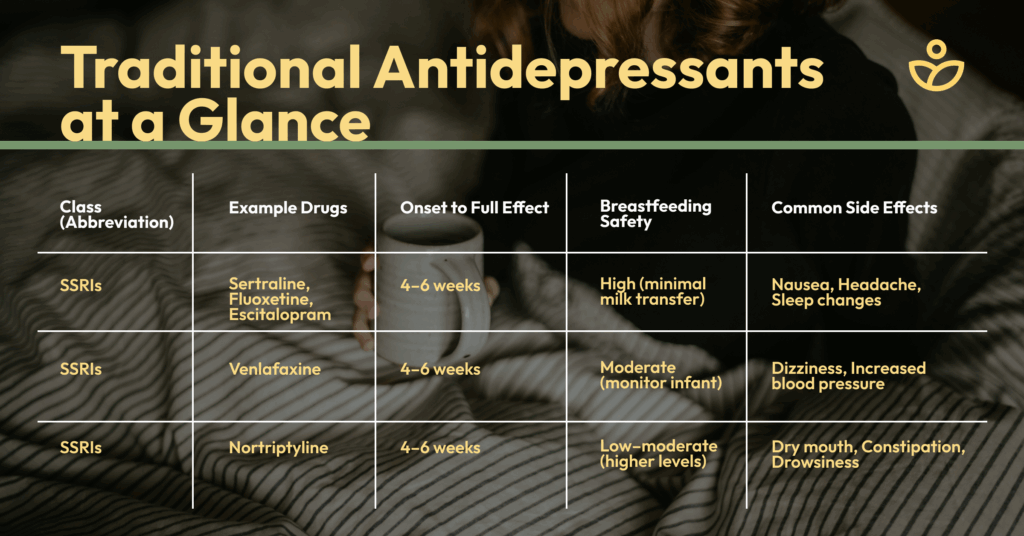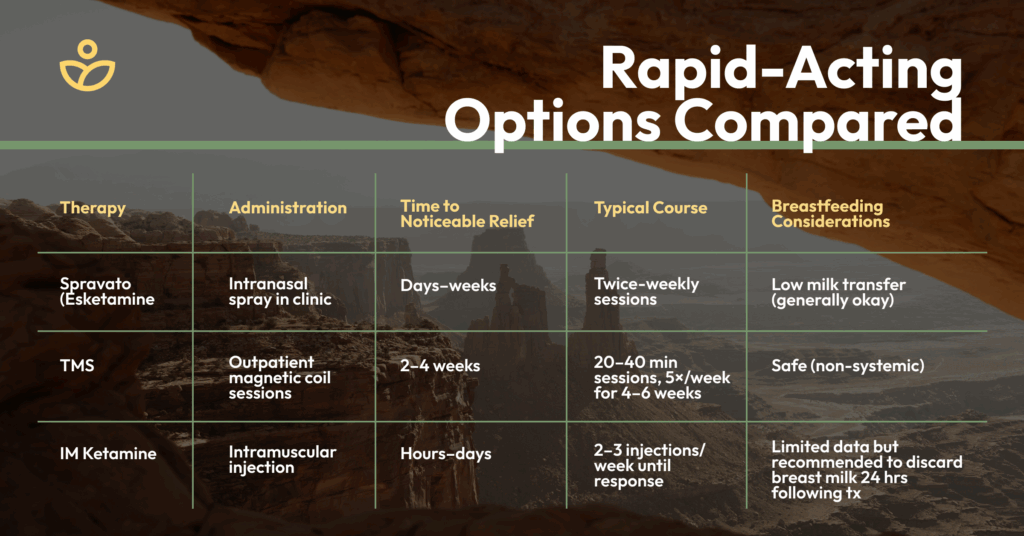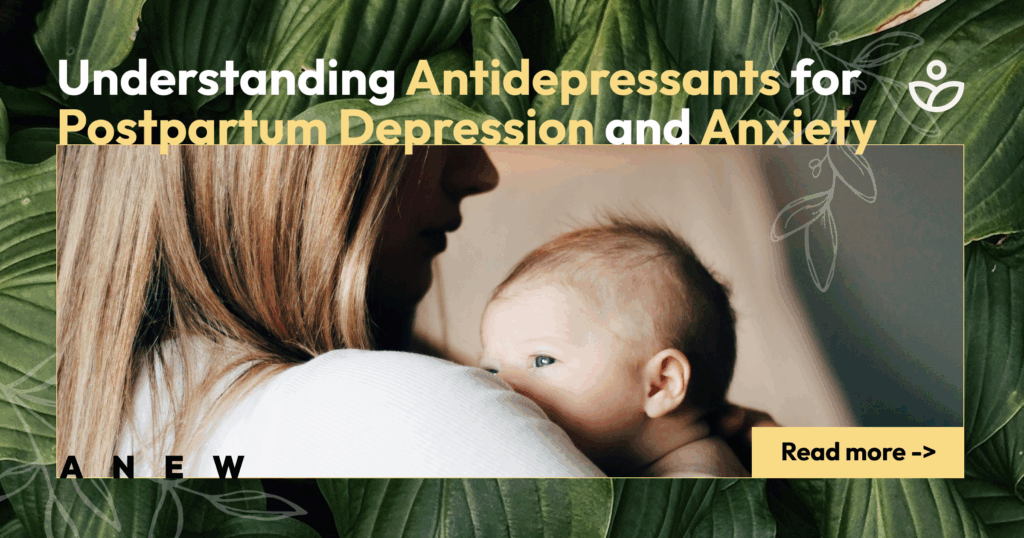Antidepressants for postpartum depression are proven medications that help restore chemical balance in the brain and treat the intense sadness, anxiety, and other symptoms that affect about 1 in 7 new mothers. Here’s what you need to know:
- SSRIs (like Zoloft, Prozac) are the most commonly prescribed first-line treatment
- Most antidepressants are safe while breastfeeding, with medications like sertraline showing minimal transfer to breast milk
- Treatment typically takes 4-6 weeks to show full effects and may continue for 6-12 months
- Newer rapid-acting options like Spravato (esketamine nasal spray) and TMS (Transcranial Magnetic Stimulation) can offer faster relief than traditional medications
The postpartum period brings massive hormonal shifts that can trigger serious mood changes. While some emotional ups and downs are normal – what doctors call the “baby blues” – postpartum depression (PPD) is different. It’s more intense, lasts longer, and significantly impacts your ability to care for yourself and your baby.
PPD affects 10-15% of new mothers globally, with rates ranging from 8% to 20% according to CDC data. The good news? Treatment works, and recovery is absolutely possible. Whether through traditional antidepressants, rapid-acting therapies like TMS, or newer options like Spravato, effective help is available.
Leaving PPD untreated carries serious risks, from impaired mother-baby bonding to developmental delays in children. Maternal suicide is actually the leading cause of death in the first postpartum year, making treatment not just important but potentially life-saving.
How Antidepressants Work for Postpartum Depression
Antidepressants for postpartum depression work by targeting the brain chemicals that regulate your mood and emotions. Think of your brain as having a delicate chemical orchestra – during pregnancy and after birth, massive hormonal changes can throw this entire system out of tune.
When estrogen, progesterone, and allopregnanolone levels plummet after delivery, they can disrupt neurotransmitters like serotonin. This “feel-good” chemical helps stabilize your mood, but when it’s not working properly, you might experience the intense sadness, anxiety, and overwhelming feelings that characterize postpartum depression.
Traditional antidepressants help restore this balance by preventing your brain from reabsorbing serotonin too quickly. This makes more of this mood-stabilizing chemical available where you need it most.
Common Types of Antidepressants and Their Side Effects
SSRIs (Selective Serotonin Reuptake Inhibitors) are typically the first choice for treating postpartum depression because they’re both effective and have a strong safety profile. Sertraline (Zoloft) is the most commonly prescribed for new mothers, especially those who are breastfeeding. Fluoxetine (Prozac) offers a longer-acting option, while escitalopram (Lexapro) is often well-tolerated with fewer side effects.
SNRIs (Serotonin-Norepinephrine Reuptake Inhibitors) like venlafaxine (Effexor XR) work on both serotonin and norepinephrine. These can be particularly helpful when anxiety is a major part of your symptoms.
Tricyclic antidepressants (TCAs) like nortriptyline are older medications that doctors sometimes turn to when SSRIs aren’t doing the job. However, they typically come with more side effects.Most people experience some side effects when starting antidepressants, but the good news is they’re usually mild and often fade within the first few weeks. Common ones include nausea, headaches, sleep changes, dizziness, appetite changes, and decreased sex drive. While these can be frustrating, they’re generally temporary as your body adjusts.

Treatment Timeline and Breastfeeding Safety
Here’s what many new mothers find surprising: traditional antidepressants typically take up to 6 weeks to reach full effectiveness. Some people notice improvements within 2-3 weeks, but patience is key. The typical treatment course lasts 6-12 months to prevent symptoms from returning.
For breastfeeding mothers, there’s reassuring news. Most antidepressants are safe while nursing, appearing in breast milk in very low amounts. Research consistently shows no harmful effects on babies when these small amounts are passed through breast milk. Sertraline is often the preferred choice because it has minimal transfer to breast milk and decades of safety data.
The decision about medication while breastfeeding should always involve a thorough risk-benefit discussion with your healthcare provider. They’ll consider factors like your specific symptoms, medical history, and treatment goals.
While traditional antidepressants remain an important treatment option, newer approaches like TMS (Transcranial Magnetic Stimulation) and Spravato (esketamine nasal spray) offer faster relief for mothers who need more immediate symptom improvement. These advanced therapies work differently than traditional antidepressants and can provide benefits within days or weeks rather than months.
Advanced and Rapid-Acting Therapies at Anew Therapy
When you’re struggling to get through each day, waiting 4-6 weeks for traditional antidepressants for postpartum depression to work can feel like an eternity. Every day matters when you’re trying to bond with your baby and get back to feeling like yourself. That’s exactly why Anew Therapy offers advanced, rapid-acting treatments that can provide relief much faster than traditional medications.

Spravato (esketamine nasal spray) has been a game-changer for many mothers with PPD. Unlike traditional antidepressants that work on serotonin, Spravato targets your brain’s glutamate system – think of it as taking a completely different pathway to healing. Many patients notice improvement within days to weeks rather than months. The treatment is administered as a simple nasal spray twice weekly in our comfortable clinic setting, and it’s often covered by insurance – making this breakthrough therapy accessible when you need it most.
TMS (Transcranial Magnetic Stimulation) offers another powerful option that’s completely different from what many people fear about brain treatments. TMS is absolutely not ECT – there’s no anesthesia, no seizures, and no memory loss. Instead, it uses gentle magnetic pulses to stimulate specific areas of your brain that control mood. You can think of it like a targeted workout for your brain’s mood centers. Sessions are comfortable, and you can drive yourself home and return to your normal activities immediately afterward. Most patients begin seeing improvement within 2-4 weeks. Visit our TMS services page to see if this drug and medication-free treatment might be right for you.
IM Ketamine therapy provides the fastest relief of all our options, often working within hours to days. This treatment involves intramuscular injections of ketamine and can be particularly helpful for mothers experiencing severe symptoms or those who haven’t found success with other treatments. It’s especially valuable for treatment-resistant cases where traditional approaches haven’t provided adequate relief. However, due to limited data on milk transfer, it may not be recommended for mothers who are actively breastfeeding.
What makes these therapies particularly valuable for postpartum depression is their speed. The early months with your baby are precious bonding time that you can’t get back. These rapid-acting treatments can help you feel more like yourself during this critical period, allowing you to enjoy motherhood rather than just survive it.
At Anew Therapy in Utah, we understand that every mother’s journey is unique. We work closely with each patient to determine the best approach based on your specific symptoms, medical history, and treatment goals. Our team specializes in creating personalized treatment plans that consider your role as a new mother, including breastfeeding considerations and your family’s needs.
Whether you’re facing PPD for the first time or haven’t found relief through medication alone, know this: You are not alone – and fast, effective help is within reach.
Schedule your free consultation today.

Are you a Utah mother struggling with postpartum depression? Anew Therapy offers expert care and safe, proven results. Schedule your free evaluation today.

